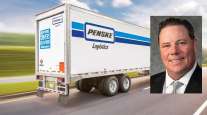US Appeals Court Upholds Calif. Meal Break Law in Penske Case
This story appears in the July 14 print edition of Transport Topics.
A U.S. appellate court last week upheld a California law requiring employers to provide a paid 30-minute meal break for employees working more than five hours, reversing a lower court that had ruled a federal law pre-empted the state requirement for truckers.
The 9th U.S. Circuit Court of Appeals sent back to a federal district court in California a major meal-break class-action lawsuit filed in 2008 against Penske Logistics that Penske had won at the lower court.
Penske has argued, and district court agreed, that California’s law requiring employers to give workers meal and rest breaks was pre-empted by the Federal Aviation Administration Authorization Act of 1994, which blocks state laws from interfering with a motor carrier’s prices, routes or services.
The three-judge panel held that California’s meal and rest break laws were not related to Penske’s “prices, routes or services” and were therefore not pre-empted by the FAA law.
“Congress did not intend to pre-empt generally applicable state transportation safety, welfare or business rules that do not otherwise regulate prices, routes or services,” the appeals court said in its July 9 ruling.
Richard Pianka, deputy general counsel for American Trucking Associations, told Transport Topics that the decision could have a broad sweep because about a dozen other federal district court judges have ruled that motor carriers are exempt from the requirements of the California law.
ATA and the Truck Renting and Leasing Association filed “friend-of-the-court” briefs in support of Penske.
Pianka said if the driver class ultimately prevails in the case, the breaks will “take a pretty decent chunk out of every driver’s day.”
“The 9th Circuit opinion basically means the floodgates are open for class actions on allegations of meal and rest break violations,” Pianka said.
Adam Smedstad, an attorney with Indianapolis-based Scopelitis, Garvin, Light, Hanson & Feary PC — which is representing Penske in the lawsuit — declined comment last week.
And James Hill, an attorney with the San Diego law firm of Cohelan Khoury & Singer, who represents the lead driver in the case, could not be reached for comment.
The California law, first tested in a restaurant lawsuit, also requires hundreds of employers in the state to offer a second 30-minute meal break after an employee works 10 hours.
For transportation workers whose daily work time is at least 3½ hours, employers also must provide a paid rest period of 10 minutes for every four hours “or major fraction thereof.”
The lawsuit against Penske’s Logistics and Leasing companies was filed by three exempt California driver-installers working in Ontario, California.
The drivers alleged that the company failed to provide the meal breaks but docked their paychecks for 30 minutes for every shift they worked.
Although the appeals court conceded that the meal and rest break law would add costs for motor carriers, it said the law does not “set prices, mandate or prohibit certain routes, or tell motor carriers what services they may or may not provide, either directly or indirectly.”
The court wrote: “Defendants argue that mandatory breaks mean that drivers take longer to drive the same distance, providing less service overall. But that argument equates to nothing more than a modestly increased cost of doing business, which is not cause for preemption.”
In a statement, Michael Duff, Senior Vice President & General Counsel of Penske, said the company is disappointed by the decision: "We believe federal district court Judge Sammartino correctly determined that California’s meal and rest break rules as applied to motor carriers were preempted by the FAAAA. We are still evaluating the decision and considering our options for review going forward."
The case will be sent back to the district court for a possible trial on the drivers’ claims, unless Penske seeks a rehearing with the full 9th Circuit or a review by the U.S. Supreme Court.



